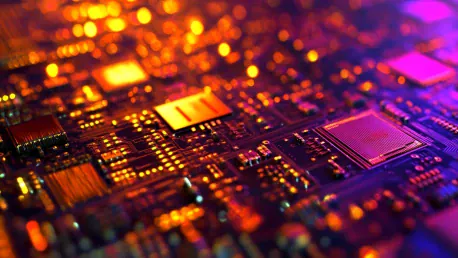The rapidly shifting landscape of the semiconductor industry has been marked by fierce competition between major chip manufacturers Qualcomm and Arm, both vying for dominance in the integration of advanced AI capabilities into their products. This rivalry has been highlighted by ongoing interest and developments surrounding the potential acquisition of UK-based semiconductor intellectual property supplier Alphawave, known for its pioneering serializer-deserializer (SerDes) technology. This specialized technology is critical for controlling the speed of data transfer on and off a chip, playing a crucial role in enhancing AI processor capabilities in devices ranging from smartphones to data centers.
Qualcomm’s Strategic Interests
Qualcomm has remained steadfast in its pursuit of Alphawave, with a decision deadline set for April 29. This acquisition is seen as a strategic move to further strengthen Qualcomm’s position in the AI-enabled smartphone market. As a leading supplier of chipsets for various smartphone manufacturers, including Samsung, Google, Apple, and several prominent Chinese vendors like Oppo, Qualcomm aims to utilize Alphawave’s SerDes technology to accelerate AI advancements in its products. This aligns with the growing demand for sophisticated AI features in modern smartphones, which require high-speed data transfer capabilities to function efficiently.
However, Qualcomm faces potential obstacles in its acquisition plan. Alphawave’s association with WiseWave, a Chinese joint venture under Wise Road Capital, complicates the deal. WiseWave’s inclusion on a US blacklist over national security concerns adds a layer of complexity for Qualcomm. Navigating these geopolitical challenges will be crucial for Qualcomm to successfully acquire Alphawave and integrate its technology into its product portfolio. Qualcomm’s commitment to advancing AI technology is further highlighted by its recent acquisition of Movidian Artificial Intelligence Application and Research JSC. This acquisition aims to enhance Qualcomm’s GenAI research and development efforts, accelerating the development of advanced AI solutions for products such as smartphones, PCs, and software-defined vehicles. Movidian’s expertise in GenAI, machine learning, computer vision, and natural language processing complements Qualcomm’s ambitions in creating smarter technology.
Arm’s Withdrawal and Its Implications
Initially, Arm expressed interest in acquiring Alphawave to bolster its own AI processor capabilities through the integration of SerDes technology. This would have enabled Arm to improve data transfer efficiency in its AI applications, benefiting a variety of tech products, including smartphones and data centers. However, after initial exploratory discussions with Alphawave and investment bankers, Arm decided to withdraw from the bidding war. Several factors influenced this decision, including the significant interest shown by competitors like Broadcom.
Broadcom’s success in securing substantial AI chip clients, such as Alphabet’s Google and OpenAI, due to critical SerDes technology, highlighted the intense competition in the market. Arm’s decision to step back from pursuing Alphawave may result from a strategic reassessment of its priorities and resources. By choosing not to engage further in the bidding war, Arm might be focusing on other opportunities to advance its AI processor technology without the complexities associated with acquiring Alphawave.
Moreover, Arm’s retreat opens the door wider for Qualcomm to solidify its position as a leader in AI-enabled semiconductor technology. As the competition within the semiconductor industry continues to evolve, Arm’s decision to withdraw from the race for Alphawave could shape future strategies for major players seeking to secure technological resources that drive innovation.
The Geopolitical Dimension
The semiconductor industry has always been influenced by broader geopolitical considerations. The increasing focus on national security, especially regarding partnerships and acquisitions involving Chinese firms, adds another layer of complexity for companies like Qualcomm. Alphawave’s connection with WiseWave, coupled with WiseWave’s listing on a US blacklist, underscores the challenges Qualcomm faces in navigating regulatory and geopolitical hurdles. Successfully addressing these issues will be crucial for Qualcomm to complete the acquisition without facing significant setbacks.
The broader implications of such geopolitical dynamics extend beyond individual companies to the industry as a whole. As countries increasingly prioritize technological sovereignty, the semiconductor industry is likely to see more stringent scrutiny over cross-border deals. It will be important for companies to adapt their strategies, considering not only technological advancements but also geopolitical factors that can impact their operations and growth trajectories.
Future Considerations
The semiconductor industry is rapidly evolving, highlighted by intense competition between leading chipmakers Qualcomm and Arm. These tech giants are aggressively pursuing dominance in integrating advanced AI capabilities into their chip offerings. The rivalry is further exemplified by their keen interest in the potential acquisition of Alphawave, a prominent UK-based semiconductor intellectual property provider. Alphawave is renowned for its groundbreaking serializer-deserializer (SerDes) technology, which is pivotal for managing data transfer speeds on and off chips. This technology is essential in boosting AI processor performance across a wide range of devices, from smartphones to data centers. The integration of SerDes technology is critical for enhancing the efficiency and responsiveness of AI-driven applications, solidifying the importance of Alphawave in the semiconductor sector’s future. As both Qualcomm and Arm continue their aggressive advancements, their focus on Alphawave’s technology underscores the high stakes in the race for AI superiority.









